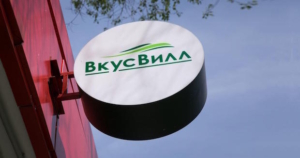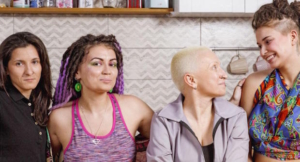
Russia’s first major corporate LGBT+ scandal

Social media went into a meltdown this week when supermarket chain VkusVill launched — and then suppressed — an ad campaign involving a homosexual couple. Vkusvill suffered significant reputational damage in what was the first major LGBT+ scandal to engulf a top Russian company.
- VkusVill is a successful Moscow food retailer that is somewhat comparable to U.S. chain Whole Foods. The company promotes a healthy lifestyle and stocks fresh food, healthy ready-made meals, and plenty of sugar-free options. A typical VkusVill customer is a ‘sophisticated’ city resident with a slightly above average budget and a desire to ditch their bad habits.
- This was the audience targeted by VkusVill’s latest ad campaign launched late last week. On June 30, the chain published an ad in article form with the title “Recipes for happy families”. One of the families featured was a Russian family that included a lesbian couple, Alina and Ksenia; and Alina’s mother and sister.

- The PR department must have been aware there are laws in Russia against the ‘promotion’ of homosexuality (the definition of promotion is extremely vague) and their ad was likely to be controversial. For the first time in VkusVill’s history, its аd was rated 18+ and the accompanying text admitted “it would be hypocritical not to talk about the real families of our customers.”
- The first reactions on Vkusvill’s social media аccounts were mixed: both outraged promises to stop shopping at VkusVill and messages of support. The original post with the article received over 40,000 likes on social media and the company issued new posts defending the inclusion of the lesbian couple.
- However, it wasn’t long before the ad attracted the attention of social conservatives (RT editor-in-chief Margarita Simonyan, for example, pledged she would no longer shop at VkusVill) and anti-LGBT+ activists including homophobic group Men’s State. The general tone of comments on social media changed and both VkusVill and the featured family began receiving violent threats.
- Roman Polyakov, head of the VkusVill department that came up with the ad, took public responsibility. He said his bosses only learned of the content after publication, in line with company policy. “Senior managers reacted positively and more importantly so did the audience,” he said in one interview.
- But Vkusvill did a screeching U-turn Sunday when the ad was taken down and replaced by an apology signed by all of the company’s managers (but without Polyakov). “An article offended the feelings of many of our customers, colleagues, partners and suppliers. We are sorry that this happened and consider it to be our mistake arising from a lack of professionalism of individual employees. The aim of our company is to give our customers a chance to buy fresh, tasty food every day, and not to publish articles that push some kind of social or political agenda,” the statement read.
- The volte-face caused anger and disappointment among those who had been given hope by VkusVill’s original stance. “This ‘apology’ is absolutely without ethics,” wrote one person on social media. RT boss Simonyan even weighed in again on Twitter: “The traditionalists, people like me, have been lost … and now the very audience with which they flirted is seriously disappointed,” she said.
- The story might have international consequences. Vkusvill is planning an IPO in the U.S. and opened a store in Amsterdam last year. For more on the planned IPO and international expansion you can watch this Russian-language interview with CEO Andrei Krivenko as part of our Russians are OK! series.
- Despite boycott calls, the scandal is actually unlikely to hit the company’s bottom line. The retailer did well last year, increasing revenues by 38 percent to 128 billion rubles ($1.7 billion). Over 10 percent of this came from their delivery service (by January it was 25 percent). Krivenko remains the majority owner of the company, but Russia-focused private equity fund Baring Vostok Capital holding about 12 percent (a Baring Vostok Capital spokesperson declined to comment on the situation with the ad when approached by The Bell).
- VkusVill’s PR failings in this saga are obvious: the negative impact of wading into such a socially divisive issue was compounded by an ‘apology’ that alienated a significant chunk of its audience. But for Russian companies, this story may yet be beneficial (as an example of what not to do) because — sooner or later — they will have to find ways to appeal specifically to LGBT+ audiences – if not out of a belief in inclusivity, then for commercial reasons.
Why the world should care: Foreign brands that have presented themselves as gay-friendly for decades need to take into account Russia’s homophobia (which is actively encouraged by the state). Even IKEA — generally seen as a company that found the right ‘voice’ in Russia — got burned in 2016 when gay couples took the top prizes in a competition. Just like for Vkusvill, IKEA found itself facing bitter criticism and at the center of a media storm.




